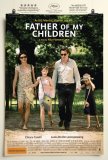Father of My Children, The (France, 2009)
July 20, 2010
Spoiler Alert: This review mentions a key event that occurs mid-way through the movie. Those wishing a "virgin viewing experience" for The Father of My Children are urged to stop reading here and return to the review once they have seen the film.
The Father of My Children, the sophomore feature effort from director Mia Hansen-Løve, starts out as one film but ends up as another. Initially, the movie appears to be about how some parents, in attempting to balance work and family, end up shortchanging the latter in the service of the former. Ultimately, however, this is a more complex and emotionally demanding motion picture: one that presents an autopsy of a suicide, including the factors that lead up to it and the repercussions it has on those who are close to the victim. Despite the subject matter, however, The Father of My Children is neither overly sentimental nor depressing. It approaches the suicide as a fact of life and shows how individuals, once past the initial grief-induced paralysis, can overcome the guilt and move forward in positive and constructive ways. Hansen-Løve does not employ manipulative stock scenes (for example, there is no funeral or wake) designed to play on the viewer's emotions. There are tears, to be sure, but no more than necessary. Members of the audience may be shocked and saddened by the death but, like the characters, they recover.
At first, The Father of My Children appears to be an uncannily perspicacious expose of the independent French film industry. The lead character, Grégoire Canvel (Louis-Do de Lencquesaing), is based on the real-life prolific producer, Humbert Balsan, who killed himself at age 50 with dozens of credits on his resume. (The Father of My Children is dedicated to him.) Grégoire is introduced as an upbeat individual with seemingly boundless energy. He is a devoted father and loving husband, but he never leaves work behind. When he is at home or on vacation, a cell phone is rarely far from his ear. When The Father of My Children begins, Grégoire's company, Moon Films, is in financial difficulty, but he is convinced "something will turn up." Things don't get better, however. Productions go over-budget, doors to new credit are slammed shut, and Grégoire finds himself drowning in red ink. He sees the financial failure of his company as a personal failure, despite the best efforts of his wife, Sylvia (Chiara Caselli), to convince him otherwise. In a moment of despair, he burns some papers then puts a gun to his head and pulls the trigger.
In the wake of Grégoire's death, his wife and three children explore different coping methods. Sylvia decides to pour all her efforts into saving Moon Films and, if she can't succeed in that endeavor, she is determined to at least ensure that the in-production movies are completed. Grégoire's teen-age daughter, Clémence (Alice de Lencquesaing), investigates parts of her father's life she did not know about. Middle daughter Valentine (Alice Gautier) struggles to reconcile how Grégoire's "sadness" could trump his love for his family. And young Bille (Manelle Driss) recovers with a quickness that only children can display.
Hansen-Løve, who is married to legendary director Olivier Assayas, displays extraordinary maturity for one so young (she was 28 when she made The Father of My Children). This is no soap opera; it is a thoughtful, painstaking dissection of the circumstances that can cause a seemingly stable man to take his own life and how such an act of destruction can reverberate among the group of people who loved him. During the first half, as Grégoire's financial situation gradually worsens, we can feel the pressure building. Initially, we, like the character, think he will find a way out. After a while, however, we wonder where the story is taking us. The decision to eliminate the main character halfway through is both necessary and unexpected. Those attending The Father of My Children without knowledge of the subject matter are likely to be shocked. This doesn't rank alongside Hitchcock's killing of lead actress Janet Leigh partway through Psycho, but there are similarities.
For her cast, Hansen-Løve elected to choose lower profile actors - no Gerard Depardieu or Daniel Auteuil, for example. The decision is propitious; the lack of familiar faces adds to the seeming authenticity of the production. Louis-Do de Lencquesaing, who has had a fruitful career (albeit comprised mainly of secondary roles), provides an effective presentation of Grégoire - happy-go-lucky to start and morose and self-absorbed at the end. Chiara Caselli is solid as the wife stuck with cleaning up the mess left behind by her husband. And the three young actresses playing the children (including de Lencquesaing's daughter, Alice, as the eldest) are free of the artifice that often plagues young performers.
The Father of My Children is exceptional drama. Compelling and unforced, it shows sensitivity and evenhandedness in approaching a difficult subject. The success with which writer/director Hansen-Løve's presentation is received is a testimony to the way in which she has touched an emotional chord without playing upon it like a master manipulator.
Father of My Children, The (France, 2009)
Cast: Louis-Do de Lencquesaing, Chiara Caselli, Alice de Lencquesaing, Alice Gautier, Manelle Driss, Eric Elmosnino
Screenplay: Mia Hansen-Løve
Cinematography: Pascal Auffray
Music:
U.S. Distributor: IFC Films
U.S. Release Date: 2010-07-23
MPAA Rating: "NR" (Mature Themes)
Genre: DRAMA
Subtitles: In French with English subtitles
Theatrical Aspect Ratio: 1.85:1
- (There are no more better movies of Louis-Do de Lencquesaing)
- (There are no more worst movies of Louis-Do de Lencquesaing)
- (There are no more better movies of Chiara Caselli)
- (There are no more worst movies of Chiara Caselli)
- Summer Hours (L'Heure d'ete) (2009)
- (There are no more better movies of Alice de Lencquesaing)
- (There are no more worst movies of Alice de Lencquesaing)
Comments